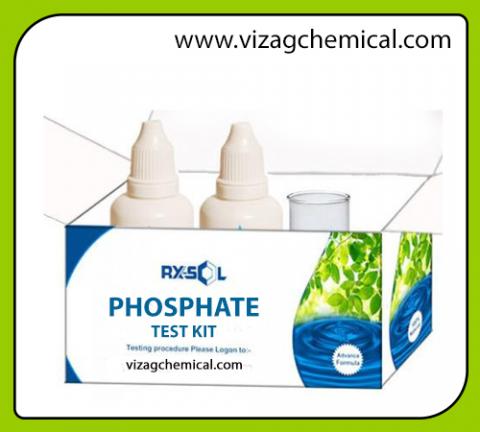Primary tabs

Phosphate Test Kit
Determination of PHOSPHATE level very Simple way. Phosphate measurement is used to control scale and corrosion inhibitor levels in boilers and cooling towers. Reactive phosphate will give a positive reaction.
This is applicable to laboratory analysis particularly in the determination of PHOSPHATE. Such an analytical test may be either qualitative or quantitative.
This test kit reads the total phosphate level in parts per million (ppm), which are equivalent to milligrams per liter (mg/L) from 0 - 50.0 ppm (mg/L).
Testing Procedure :::--- A Quantitative method to determine the amount of phosphate present in samples such as boiler feedwater is as follows
REAGENT & APPARATUS:
Reagent: RXSOL TK 10 , TK 11 ( or TK 12 ) . Apparatus : TEST TUBE , Titrator or DROPPER
PROCEDURE for test ( STEP WISE ):
1. Rinse a clean test tube with water being tested.
2.Fill the sample cup to the 2.5 mL mark with the sample to be tested (fig ).
3.Add 20 drops of RXSOL TK 10 solution Activator Solution. Cap the sample cup and shake it to mix the contents well..
4. Now, holding the bottle vertically, add 5 drops from TK 11 ( or TK 12 ) Test Solution . Note: RXSOL TK 12 contains a very thick solution and may require increased pressure to release drops.
5.To mix completely, invert it several times, allowing the bubble to travel from end to end.
6. Wait 2 - 3 minutes for color development.
7. Obtain a test result using the appropriate comparator chart, place the glass test jar on colour card & match with various shade of colour .or online www.rxmarine.com/phosphate-test-kit
8. Read the test results by comparing the color of the solution to the appropriate Phosphate Color Card (choose either Freshwater or Saltwater). The tube should be viewed in a well light area against the white area of the card. The closest match indicates the ppm (mg/L) of total phosphate (PO43–) in the water sample. Rinse the test tube with clean water after use.
Other Reagent Required :::
Phenolpthalein indicator Aqueous Solution : Part No.- RXSOL-60-6030-001 ( https://www.rxmarine.com/Phenolphthalein-Indicator-Solution )
Sulfuric acid solution (300 mL conc H2SO4 in 1 L H2O) Part No.- RXSOL-60-6286-500 ( https://www.rxmarine.com/SULPHURIC-ACID-STANDARDIZED-SOLUTION )
One drop (0.05 mL) phenolpthalein was added to 50 mL of sample. If red color developed H2SO4 was added to discharge the color.
Why Test for Phosphate?
Abnormally high levels of phosphate can lead to organ damage due to calcification (calcium phosphate deposits in organs, such as the kidneys).
Phosphate levels are normally higher in young children than in adults because their bones are actively growing. Low phosphate levels in children can inhibit bone growth. Very low levels of phosphate are rare but require swift medical attention.
Soft drinks and pre-packaged food items are high in phosphate content, sometimes as phosphoric acid, which some nutritionists believe contributes to over consumption of phosphorus.
Test results may be affected by the use of enemas and laxatives containing sodium phosphate, excess Vitamin D supplements, and by intravenous glucose administration.
Also effective test for :::
Phosphate (PO43–) enters the aquarium from fish and invertebrate waste and decaying organic matter, such as dead algae and uneaten fish food.
Water treatment facilities may add phosphate to tap water to prevent pipe corrosion and reduce concentrations of heavy metals in drinking water.
Some salt mixes also contain phosphates. Excess phosphate may lead to algae blooms.
In saltwater aquariums, phosphate precipitates dissolved calcium (Ca2+) and magnesium (Mg2+) ions, inhibiting the growth of hard corals and other reefbuilding organisms.
GENERAL TIPS 1 :::--- A small amount of the sample is acidified with Concentrated Nitric Acid to which a little ammonium molybdate is added. The presence of Phosphate Ions is indicated by the formation of a bright yellow layer.
GENERAL TIPS 2 :::--- Standard Phosphorus Solution, 0.1 mg/mL as Phosphorus: Dissolve exactly 0.4395 g (Note 5) of reagent grade potassium dihydrogen phosphate (KH2PO4) in 500 mL of purified water in a 1 L volumetric flask; dilute to volume with purified water and mix thoroughly. Standard Solution: 2 µg Phosphorus per mL:
OTHERWISE :
Standard phosphate solutions: 22.068 mg of anhydrous KH2PO4 was dissolved in distilled water and diluted to 100 mL. Thus, 1mL = 50.3µg PO4 3 --P.
